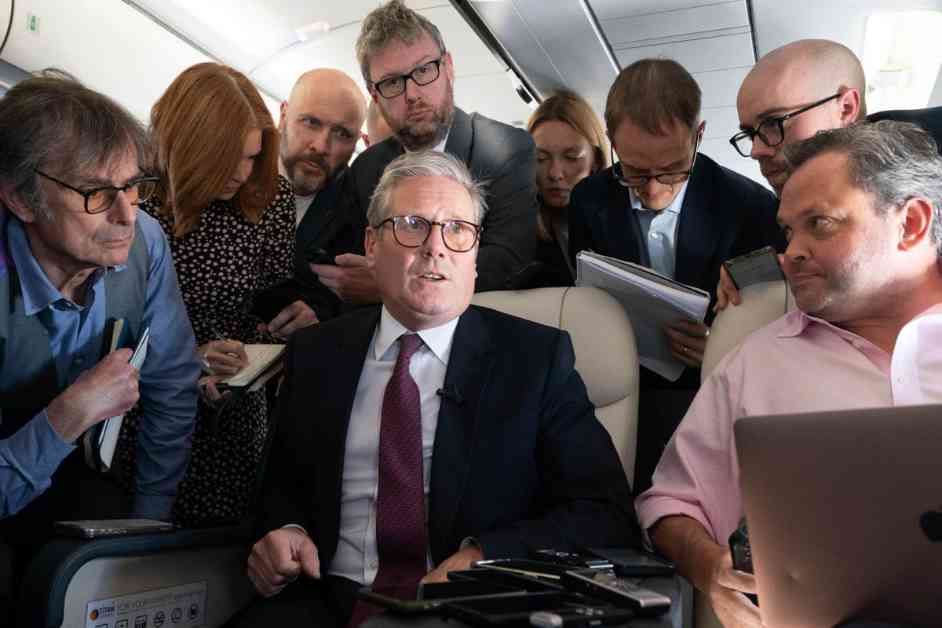Sir Keir Starmer, the Prime Minister of the United Kingdom, embarked on a crucial diplomatic mission to Washington DC to meet with US President Joe Biden. The purpose of this meeting was to discuss ongoing conflicts in Ukraine and Gaza, highlighting the importance of international cooperation in addressing global issues. As Sir Keir boarded the plane for his journey, he was faced with questions regarding the impact assessment of the decision to cut winter fuel payments for millions of pensioners.
The decision to cut winter fuel payments had significant repercussions for Sir Keir’s approval ratings, as a recent Ipsos poll indicated a notable decline in his favorability. According to the poll, 46% of respondents viewed him unfavorably, marking an eight-point increase in just three months. This decline in approval ratings underscored the challenges faced by Sir Keir as he navigated complex domestic and international issues during his tenure.
Accompanying Sir Keir on this diplomatic mission was Chancellor Rachel Reeves, who also faced scrutiny over the upcoming October Budget. The Chancellor’s favorability ratings experienced a four-point decrease, with only 23% of respondents viewing her positively. These shifts in public perception highlighted the growing pressure on government officials to address pressing economic and social issues affecting the population.
During the discussions in Washington DC, Sir Keir and President Biden were expected to deliberate on Kyiv’s request to utilize Western Storm Shadow long-range missiles in Russian territory. This proposal raised concerns from Russian President Vladimir Putin, who warned that such actions could lead to a conflict with NATO. Sir Keir emphasized that Russia bore responsibility for instigating the conflict in Ukraine and urged for a swift resolution to end the ongoing war.
As the diplomatic discussions unfolded, Sir Keir’s commitment to promoting international cooperation and resolving conflicts peacefully was put to the test. The negotiations with President Biden underscored the importance of diplomatic engagement in addressing complex geopolitical challenges and fostering stability in regions marred by conflict.
In a separate development, former immigration minister Robert Jenrick vowed to challenge Nigel Farage and his party Reform UK in the Tory leadership contest. Jenrick expressed his determination to address the underlying issues that led to the rise of Reform UK, emphasizing the need for the Conservative Party to deliver on its promises and regain the trust of voters. His campaign focused on uniting conservatives under the Tory banner and reaffirming the party’s commitment to key values such as secure borders, controlled immigration, and support for small businesses.
The discussions in Washington DC also shed light on the need for a comprehensive approach to addressing healthcare challenges in the UK. Former Labour chancellor Ed Balls highlighted the urgent need for increased resources in the NHS to support Sir Keir’s proposed reforms. Balls emphasized that without a substantial injection of resources, the desired improvements in healthcare outcomes would remain elusive, underscoring the critical role of adequate funding in driving positive change in the healthcare sector.
In response to mounting concerns over road safety and enforcement of motoring laws, the AA called for the appointment of 1,000 new roads police officers to address rising incidents of traffic violations. The organization’s analysis revealed a decline in the number of traffic officers in England and Wales, leading to a perception among drivers that they could evade punishment for reckless driving behaviors. The call for increased police presence on the roads highlighted the importance of proactive measures to ensure road safety and hold offenders accountable for their actions.
In a significant development in the energy sector, the UK government announced its decision to acquire the Electricity System Operator (ESO) from National Grid in a £630 million deal. This move marked a pivotal step towards establishing the National Energy System Operator (NESO), a public body aimed at facilitating the country’s transition to clean energy and enhancing energy security. The creation of NESO signaled the government’s commitment to advancing sustainable energy solutions and fostering innovation in the energy sector.
Amid these discussions and policy developments, the Bank of England signaled a cautious approach towards interest rate cuts in response to lingering inflationary pressures. Governor Andrew Bailey underscored the need for careful consideration in adjusting interest rates to maintain economic stability and address inflation concerns. The Bank’s decision to pause interest rate cuts reflected a balanced approach to monetary policy and a commitment to safeguarding the UK’s economic resilience in the face of external challenges.
As Sir Keir Starmer and his delegation engaged in high-stakes diplomatic talks with key international partners, the domestic landscape posed its own set of challenges and priorities. The upcoming October Budget and the implications of policy decisions on pensioners, healthcare, and public services underscored the need for effective governance and responsive leadership. The intricacies of diplomatic engagements and domestic policy considerations highlighted the complex interplay between national and international interests in shaping the trajectory of the UK’s political landscape.
Overall, Sir Keir’s visit to Washington DC and the ensuing discussions with President Biden provided a glimpse into the intricacies of diplomatic relations and the challenges of navigating global conflicts. The diplomatic mission underscored the importance of dialogue, cooperation, and strategic partnerships in addressing complex geopolitical issues and promoting peace and stability on the world stage. As Sir Keir and his team embarked on this diplomatic journey, they faced a myriad of challenges and opportunities that would shape the course of UK’s foreign policy and domestic priorities in the months to come.












